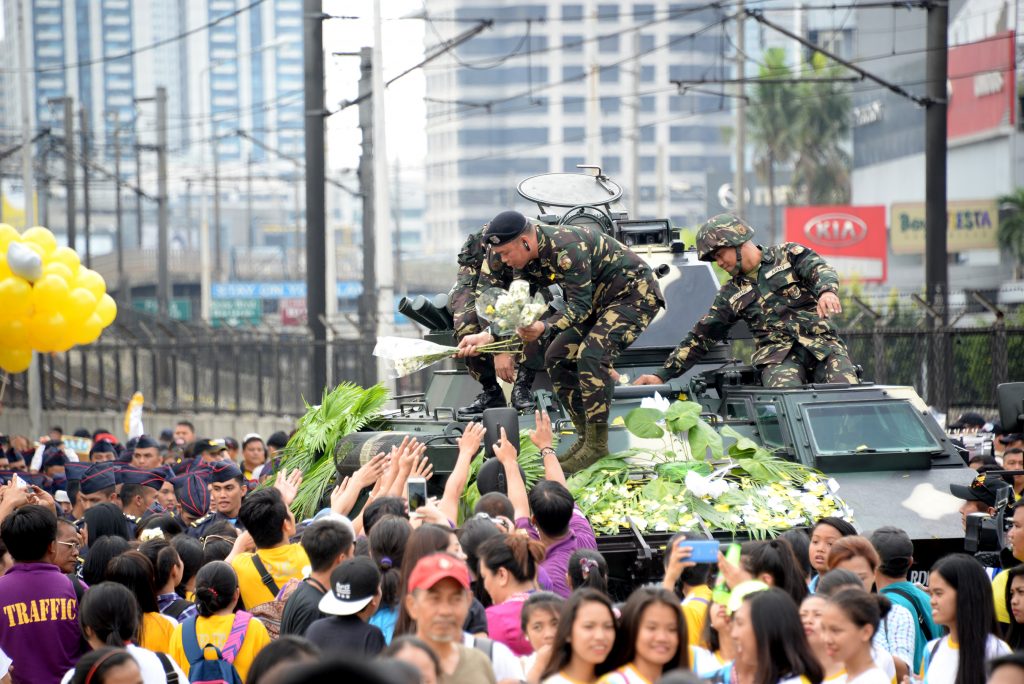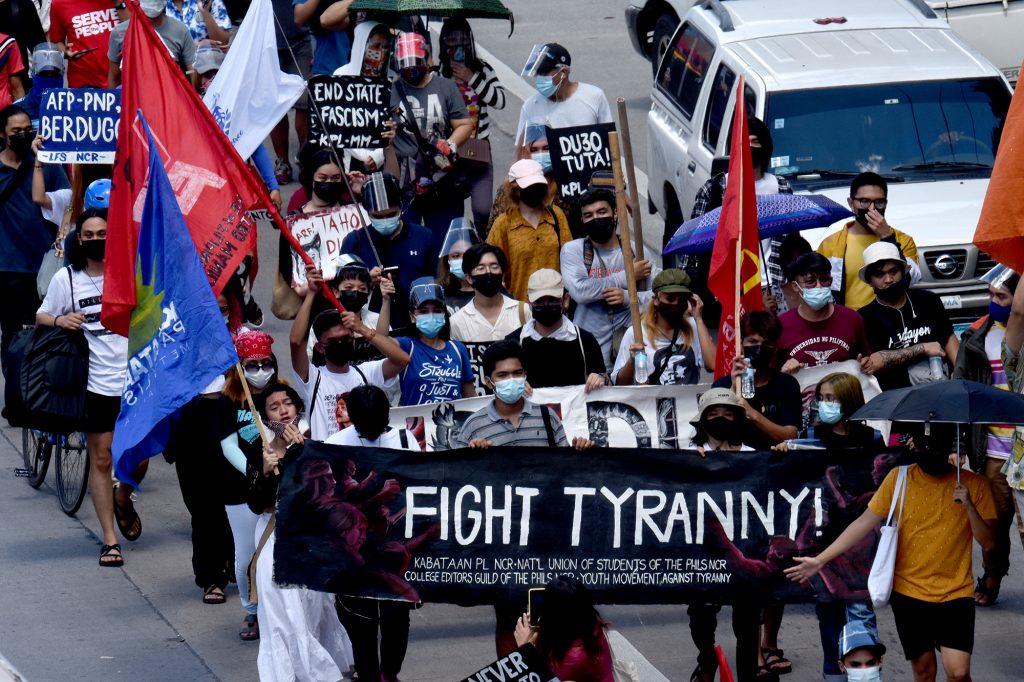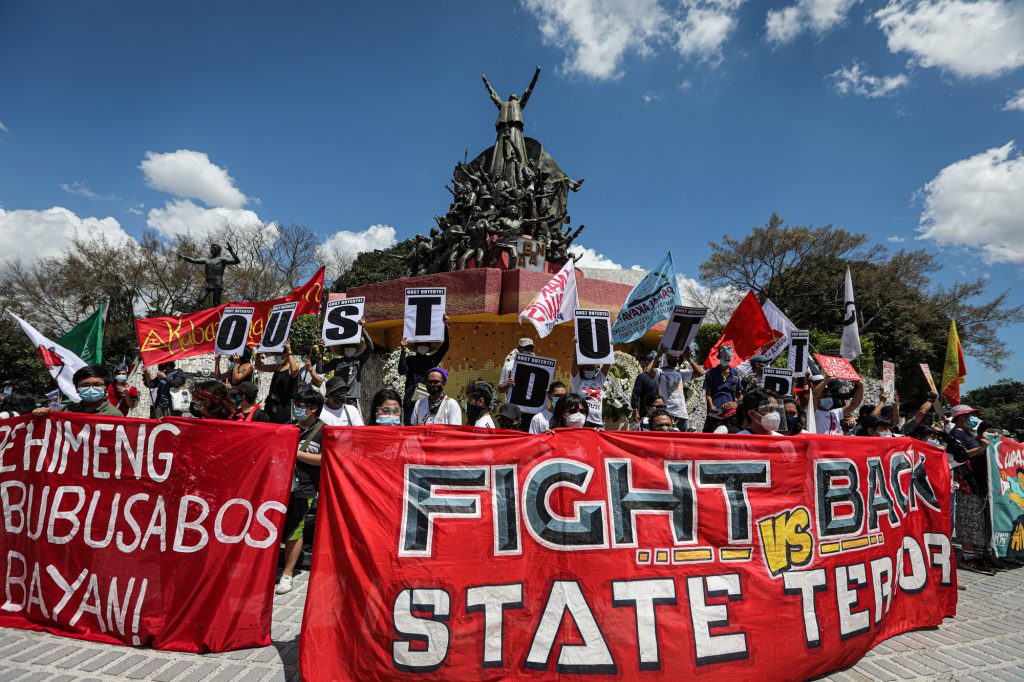
Was People Power a “revolution”?
No, not in the way revolution was defined in the streets leading to the Bastille in France in 1789 or the 1917 October Revolution of Bolsheviks in the former Petrograd, now St. Petersburg, Russia.
It has nothing at all to compare with our own revolution launched by Andres Bonifacio’s Katipunan against Spanish colonials in 1896.
In fact, People Power was everything but.
Some say it was the largest street party ever recorded—in the millions. Close, but not that close. I was there, wide-eyed as any 22-year-old who had not seen anything like it. From where I saw everything unfold, I don’t recall mojitos being passed around for free. Besides, Octoberfest was eight months away.
Others refer to it as the Filipino equivalent of the Arab Spring. This is highly unlikely because the Arab Spring came much later, sometime the final quarter of 2010. It was more like the other way around, Arab Spring being the Arab world’s equivalent of EDSA 1.
Yes, some claim we Filipinos were the first in the world to stage a peaceful “revolution” on that day in February 1986, sufficient for other nations to copy the Filipino version of an uprising. Well, if by peaceful they mean staging an insurrection without firearms, then maybe they were right.
And there are those who’ve labeled the event as the biggest failure this side of the political divide. Their reason? It forsook and betrayed its original significance, which was, as assumed by many, to uproot a largely authoritarian political order and establish lasting social changes.
A return to democracy, as they called it.
The implication, of course, rests on the largely mistaken claim that People Power was a revolution, if by revolution they mean the overthrow of government and the social order by force in favor of another.
Thing was, if at all there was an overthrow, it was the removal of a tyrant from power. That was it. People Power never sought anything more than the downfall of the dictator Ferdinand E. Marcos. And trekking to EDSA in the millions, I guess it’s safe to say that no one really thought of what the future might hold in the aftermath.
We wanted Marcos out, and that we did. Quite spontaneously, I’m happy to add. There was no premeditation involved, no previous planning sessions, so far as the people who heeded Archbishop Jaime Cardinal Sin’s call to protect the rogue soldiers were concerned.

I spoke to many who graced that marvelous occasion. Truth to tell, no one thought it would grow that huge.
So far as I could tell, lasting reforms and the overhaul of the social order were the farthest things from many people’s minds. The narrative of People Power being a revolution, if I’m not mistaken, came much, much later, when spin doctors began weaving a narrative to fit a certain political mold.
They needed to rhapsodize, and may I say glamorize, the largely spontaneous response of the people in order to anchor it on a certain political frame of mind.
In truth, there was no specific ideology to it, save perhaps that we wanted to stand free from all the killings, the corruption, and the largely cavalier treatment citizens received from the hands of the military and police, citizens whose lives took a nosedive the day Marcos declared martial law close to two decades earlier.
So, was People Power a failure? I daresay no.
If it were a true revolution, then I would probably say it did fail. But come to think of it, the revolutions which had marked the turning points in humanity’s history—the French Revolution, the October Revolution, even the Philippine Revolution against Spain—where never anything but the necessary constraints of their day.
To say that these revolutions brought about changes so impervious to the human condition that there’s no chance for tyrants to once more rise in power and take hold of the lives of millions, then you’re romanticizing revolutions to what it is not: a fairy tale.
Any cursory reading of civilization’s history will tell you that while these revolutions were underway, right in the middle of crowning the people’s freedom, or whatever ideology they were risking life and limb for, moral and social collapse ensued.
Think the Reign of Terror during the French Revolution, or the gulags of Joseph Stalin in Russia.
In our own revolution against Spain, betrayal among our own “heroes” in favor of foreign powers and personal ambitions marked our shift from being a colony to our beloved, though highly benighted, republic.
These are clear indications that however much revolutions aspire to lasting change, these changes come at a cost too bloody to mend.
Again, there was nothing in People Power to even remotely suggest that it would bring about lasting political and social changes. I cannot stress this enough: what we wanted was to dethrone the strongman.
And that we did, with prayers, smiles, songs, dances, the handing out of flowers to the soldiers in tanks, hoping against hope that we would not die right there where we stood.
The chances of us being run down by tanks, sprayed with bullets by Marcos’ loyal soldiers, hung on our heads the whole three days.
We all breathed a sigh of relief only after the Marcos family had fled Malacañang.

Thirty-five years down the road, and with several generations in tow, Filipinos are once more on the brink of a sociopolitical upheaval.
To some, this is undeniable proof that People Power has failed. That it has, for the better part of three decades, encouraged a political and social order that spawned another strongman, one more brutal and self-absorbed than the first, yet too much of a weakling and a bully that violence is his only recourse in everything.
With tyranny on the one side and a pandemic on the other, we feel trapped, unable to create the necessary firestorms that serve as heralds of change. Between these two, we face the daily pressure of inflation, infection, unemployment, retrenchment, exclusion, subjugation, corruption, and the atrocities which mark a police state.
In government, mediocrity has been the order of the day, and the last four years have been nothing but a helpless undertaking of freedom-loving citizens to reach out to fellow suffering Filipinos.
Amid all this, it seems the road to our personal and collective epiphany would be long and tiresome, stained by our own inability to remember who we were that day in February, roughly 35 years ago.
No, we weren’t heroes. We weren’t game-changers or champions, neither reformists of any stripe or political value. We were simply people who were sick and tired of tyranny, so up to our necks with rage that we showed the world how to depose a tyrant.
With songs and poems and flowers.
Joel Pablo Salud is an editor, journalist and the author of several books of fiction and political nonfiction. The views and opinions expressed in this article are those of the author and do not necessarily reflect the official editorial position of LiCAS.news.
Source: Licas Philippines
0 Comments